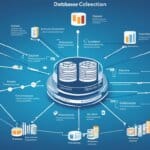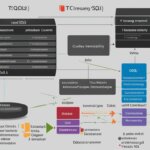Table of Contents
A database is an organized collection of structured information or data that is stored and managed electronically in a computer system. It allows for efficient storage, retrieval, and manipulation of data. Databases are designed to handle large volumes of information, making it easy to search, sort, and analyze the data.
There are various types of databases, such as relational, NoSQL, and object-oriented, each with its own unique characteristics and applications. Relational databases, the most commonly used type, use SQL for managing and querying data. NoSQL databases are used for unstructured and semi-structured data, while object-oriented databases store data in objects similar to programming languages.
In this guide, we will explore the different types of databases in detail and understand the importance of effective database management.
Types of Databases
Databases play a critical role in storing, organizing, and retrieving data efficiently. Understanding the different types of databases is essential for making informed decisions when it comes to data management. The main types of databases include relational databases, NoSQL databases, and object-oriented databases. Let’s explore each of these types in detail:
Relational Databases
Relational databases are the most commonly used type of database. They organize data in tables that are related to each other through keys. This type of database is based on the relational model and utilizes Structured Query Language (SQL) for managing and querying data. Relational databases are known for their ability to maintain data integrity and enforce relationships between tables.
Here are some popular examples of relational databases:
| Database | Description |
|---|---|
| Oracle | An enterprise-level database management system that offers scalability, security, and high performance. |
| Microsoft SQL Server | A robust relational database management system developed by Microsoft, known for its versatility and comprehensive features. |
| MySQL | An open-source relational database management system that is widely used for web applications. |
| PostgreSQL | A powerful and extensible open-source object-relational database management system. |
NoSQL Databases
NoSQL databases are specifically designed for handling unstructured and semi-structured data. Unlike relational databases, they do not rely on the traditional table structure with rows and columns. Instead, NoSQL databases store data in flexible formats such as key-value pairs, document-based, or graph-based models. This flexibility makes them highly scalable and suitable for handling large volumes of data.
Here are some popular examples of NoSQL databases:
| Database | Description |
|---|---|
| MongoDB | A document-oriented NoSQL database that offers high scalability, flexibility, and easy integration with modern web applications. |
| Cassandra | A distributed NoSQL database known for its ability to handle huge amounts of data across multiple commodity servers. |
| Couchbase | A NoSQL database designed for interactive applications that require high availability, real-time analytics, and data synchronization. |
Object-oriented Databases
Object-oriented databases store data in objects that are similar to objects used in object-oriented programming languages like Java and C#. These databases are particularly useful in scenarios where complex data relationships need to be managed. They allow for the storage and retrieval of complex data structures and support inheritance and polymorphism.
Examples of object-oriented databases include ObjectDB and db4o.
Understanding the different types of databases is crucial for choosing the right database system that aligns with your specific requirements. Whether you need a structured and rigid relational database, a flexible NoSQL database, or a database that supports complex data relationships, each type has its own unique strengths and applications.
https://www.youtube.com/watch?v=cw5R-CiEn6g
Importance of Database Management
Effective database management is essential for ensuring efficient data storage, retrieval, and manipulation. A database management system (DBMS) acts as the backbone of this process, allowing users to define, create, update, and administer databases seamlessly. By serving as a bridge between databases and users, DBMS enables efficient access and control of data.
Relational Database Management Systems (RDBMS) are widely used in the industry. They follow the relational model and utilize SQL (Structured Query Language) for managing and manipulating data. SQL encompasses various commands, including the data definition language (DDL) for creating and modifying database structures, data manipulation language (DML) for data manipulation, data control language (DCL) for managing access and permissions, and data query language (DQL) for querying data.
Database management plays a critical role in maintaining data integrity, consistency, and security. It involves designing databases and normalizing them to eliminate redundancies and enhance performance. By ensuring data accuracy and reliability, database management allows businesses to make informed decisions based on reliable information.
Overall, effective database management, supported by a robust DBMS and the use of SQL, is vital for maintaining data integrity and maximizing the value of stored information.
FAQ
What is a database?
A database is an organized collection of structured information or data that is stored and managed electronically in a computer system. It allows for efficient storage, retrieval, and manipulation of data.
What are the types of databases?
The main types of databases include relational, NoSQL, and object-oriented databases. Relational databases store data in tables that are related to each other through keys and use SQL for managing and querying data. NoSQL databases are used for unstructured and semi-structured data and store data in a flexible format. Object-oriented databases store data in objects similar to programming languages.
What are some examples of relational databases?
Some popular examples of relational databases include Oracle, Microsoft SQL Server, MySQL, and PostgreSQL.
What are some examples of NoSQL databases?
Some popular examples of NoSQL databases include MongoDB, Cassandra, and Couchbase.
What are some examples of object-oriented databases?
Some popular examples of object-oriented databases include ObjectDB and db4o.
Why is database management important?
Database management is crucial for effective data storage, retrieval, and manipulation. It ensures data consistency, accuracy, and security. Database management involves defining, creating, updating, and administering databases using a database management system (DBMS) as an interface between the database and its users.
What is an RDBMS?
Relational Database Management Systems (RDBMS) are based on the relational model and use SQL for querying and manipulating data. SQL is a programming language used for managing and manipulating databases.
What is the role of SQL in database management?
SQL includes commands for creating and modifying the database structure (DDL), manipulating the data (DML), managing access and permissions (DCL), and querying the data (DQL).
Why is data integrity important in database management?
Data integrity ensures that the data stored in the database is accurate, consistent, and reliable. It is essential for making informed decisions based on the data.













